Donald J. Robertson's Blog, page 23
January 18, 2024
Did Marcus Aurelius say Kindness is More Manly Than Anger?
In this episode, I briefly discuss what Marcus Aurelius said about masculinity, and how it might differ from what some modern self-improvement influencers say, despite their claims to be influenced by Stoicism.

Stoicism: Philosophy as a Way of Life is a reader-supported publication. To receive new posts and support my work, consider becoming a free or paid subscriber.
HighlightsThe resurgence of Stoicism and the manosphere
Stoic philosophy versus being “stoic”
Marcus Aurelius’ enemies accused him of being unmanly
Marcus’ mother and father’s influence
The influence of Emperor Antoninus Pius
What Marcus says about manliness and anger
Marcus sums up manliness in one of his favourite slogans: “Upright, not set upright.”
LinksMarcus Aurelius: The Stoic Emperor
Verissimus: The Stoic Philosophy of Marcus Aurelius
How to Think Like a Roman Emperor
Thank you for reading Stoicism: Philosophy as a Way of Life. This post is public so feel free to share it.
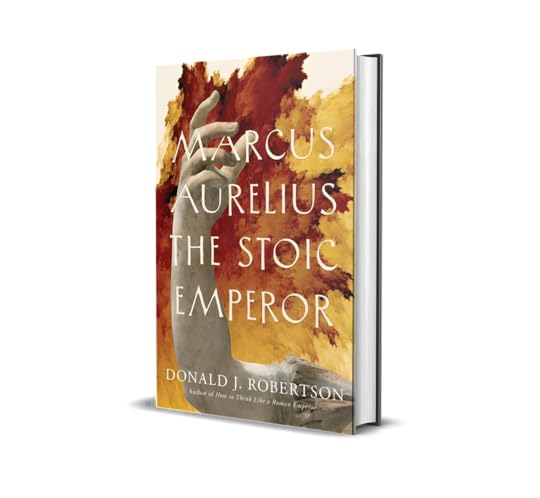
January 16, 2024
Join me for "Does Marcus Matter?"
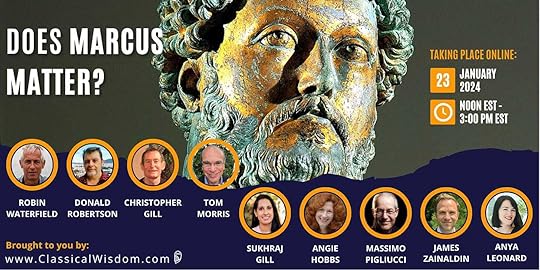
Please join us on Tuesday, January 23, 12 - 3pm EST, for the virtual event Does Marcus Matter? Can’t make it live? Register in advance and we’ll send you the full recording. See the EventBrite listing for full details, including the program of speakers. Free of charge; everyone is welcome!
Book Giveaway: Register now for a chance to can win one of three copies of my new book, Marcus Aurelius: The Stoic Emperor.
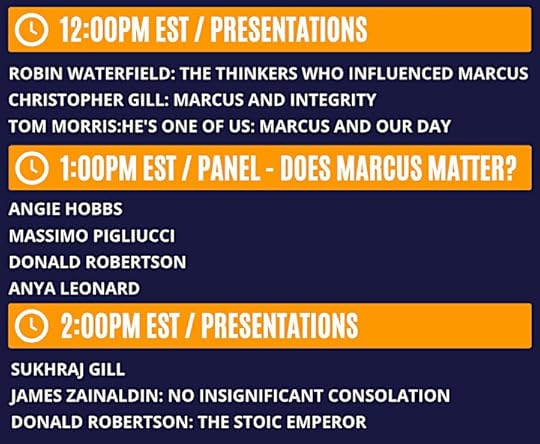
Stoicism: Philosophy as a Way of Life is a reader-supported publication. To receive new posts and support my work, consider becoming a free or paid subscriber.
This event is brought to you by Classical Wisdom, a site dedicated to bringing ancient wisdom to modern minds. Find out more, by signing up for their free Substack newsletter.
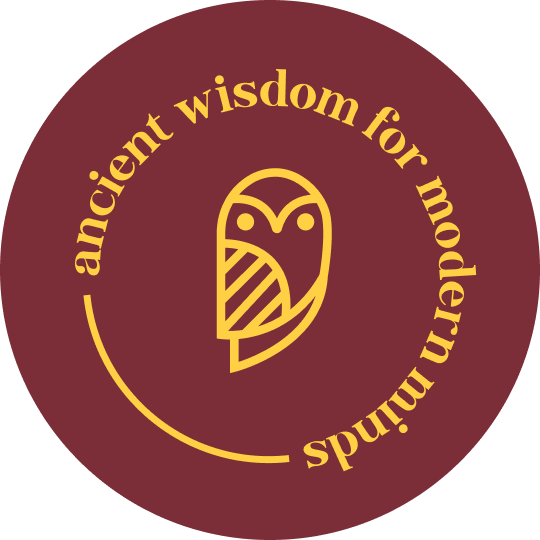 Classical WisdomBringing Ancient Wisdom for Modern Minds. Subscribe to our FREE newsletter and receive our "How to be Happy: A Guide to Ancient Ethical Philosophy".
Classical WisdomBringing Ancient Wisdom for Modern Minds. Subscribe to our FREE newsletter and receive our "How to be Happy: A Guide to Ancient Ethical Philosophy".Thank you for reading Stoicism: Philosophy as a Way of Life. This post is public so feel free to share it.
January 9, 2024
Exclusive Offer – Marcus Aurelius: The Stoic Emperor
My publisher, Yale University Press, has generously agreed to offer a whopping 30% discount to you, my Substack Subscribers, when you pre-order my new book Marcus Aurelius: The Stoic Emperor. We’re looking forward to the release. The book has already been topping the Amazon charts for new releases in ancient biographies. Hardback and Kindle versions are already online and the audiobook, which I recorded before Christmas, should also be available soon. By pre-ordering now, you help us to get the book into more stores, but you’ll also save yourself some money!
Simply click the pre-order button and at the checkout enter the coupon code Y24AURELIUS to claim 30% off. This offer is valid now, and until February 5th, 2024.
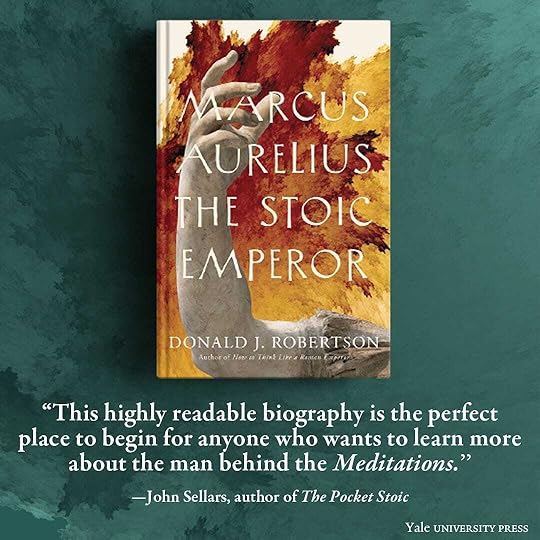
Stoicism: Philosophy as a Way of Life is a reader-supported publication. To receive new posts and support my work, consider becoming a free or paid subscriber.
Was Marcus Aurelius Murdered?
A while ago, I migrated virtually all of my writing from Medium to Substack. I still post some content there occasionally, though. In the lead up to the publication date of a new book, it helps me reach a wider audience. (Marcus Aurelius: The Stoic Emperor – available for preorder from all good bookstores!)
However, when I post an article to Medium, I’ll usually send my Substack list a special “friend link”, like the one below, so you don’t need to log into Medium to read it. Remember you can comment, bookmark, clap, or share, via Medium, if you enjoy the article! Thanks.
Stoicism: Philosophy as a Way of Life is a reader-supported publication. To receive new posts and support my work, consider becoming a free or paid subscriber.
Was Marcus Aurelius Murdered?Considering the claim that Commodus had the Stoic emperor killedIn the first act of Ridley Scott’s Gladiator (2000), Marcus Aurelius, the Roman emperor famous for being a Stoic philosopher, is portrayed by the actor Richard Harris. In the movie, Marcus is shown being smothered to death by his son, Commodus, played by Joaquin Phoenix. But is that really what happened?
 Publicity still reproduced under fair use rules. © 2000 Dreamworks LLC & Universal Pictures.
Publicity still reproduced under fair use rules. © 2000 Dreamworks LLC & Universal Pictures.Thank you for reading Stoicism: Philosophy as a Way of Life. This post is public so feel free to share it.
 Publicity still reproduced under fair use rules. © 2000 Dreamworks LLC & Universal Pictures..
Publicity still reproduced under fair use rules. © 2000 Dreamworks LLC & Universal Pictures..
January 4, 2024
What virtue do you have to deal with this?
CommentaryIn the case of everything that befalls you, remember to turn to yourself and see what faculty you have to deal with it. If you see a handsome lad or woman, you will find self-control [enkrateia] the faculty to employ here; if hard labour is laid upon you, you will find endurance; if reviling, you will find patience to bear evil. And if you habituate yourself in this fashion, your external impressions will not run away with you.
Students of Stoicism should regularly ask themselves what faculty or virtue they possess that could help them cope with the specific challenges they may face.
This is an important Stoic strategy that recurs several times in the works of Epictetus and Marcus Aurelius. Students of Stoicism should regularly ask themselves what faculty or virtue they possess that could help them cope with the specific challenges they may face. Epictetus tells his students if they practice doing this frequently they will not be overwhelmed by irrational passions, their impressions will not sweep them along.
January 1, 2024
Join me for a Q&A with the Scotland Stoics
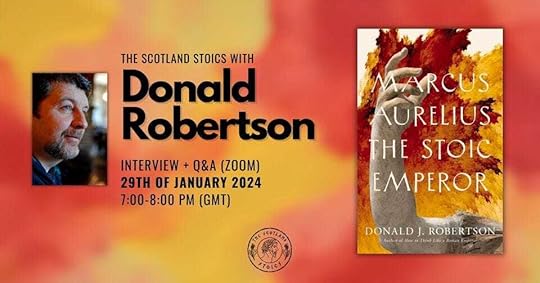
Hi everyone,
You are hereby invited to join me for a live interview and Q&A session, hosted by The Scotland Stoics. The event will take place via Zoom on 29th of January at 7 pm UK time. You can register in advance via this Google Form.
You can also learn more about the event or click “Going” on this Facebook event page to receive updates.
We’ll be discussing my forthcoming philosophical biography, Marcus Aurelius: The Stoic Emperor, which is currently available for pre-order from Amazon and anywhere else they sell books. Preordering helps us because it means the retailers are likely to stock more copies of the book. It also potentially helps you as Amazon’s pre-order price guarantee means you’ll often pay less for the book, and will receive your copy as soon as it comes out.
Stoicism: Philosophy as a Way of Life is a reader-supported publication. To receive new posts and support my work, consider becoming a free or paid subscriber.
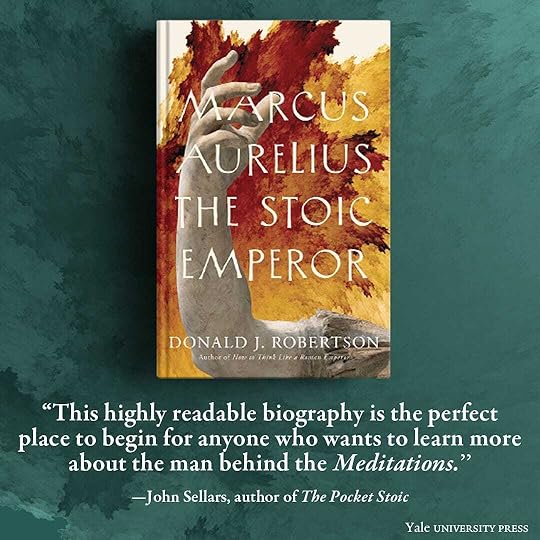
Thank you for reading Stoicism: Philosophy as a Way of Life. This post is public so feel free to share it.
December 19, 2023
Christmas and Saturnalia Special Offer
Happy Saturnalia, everyone! To celebrate the holiday season, I’m giving everyone who signs up before the end of December for a full subscription a 90-day free trial. This offer is exclusively for you, my friends and followers on Substack.
If you’re looking for a last-minute gift, you can also get a subscription for someone else.
Finally, check out our graphic novel about Marcus Aurelius, Verissimus, if you want a Stoicism present for friends or family.

The audiobook of How to Think Like a Roman Emperor also makes a great last-minute gift.
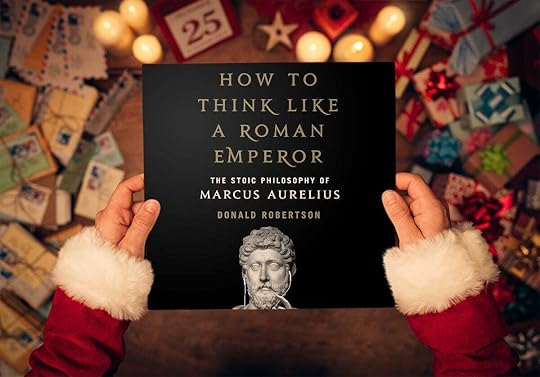
Finally, stay tuned for more information about my forthcoming biography of Marcus Aurelius, available for preorder now from Yale University Press.
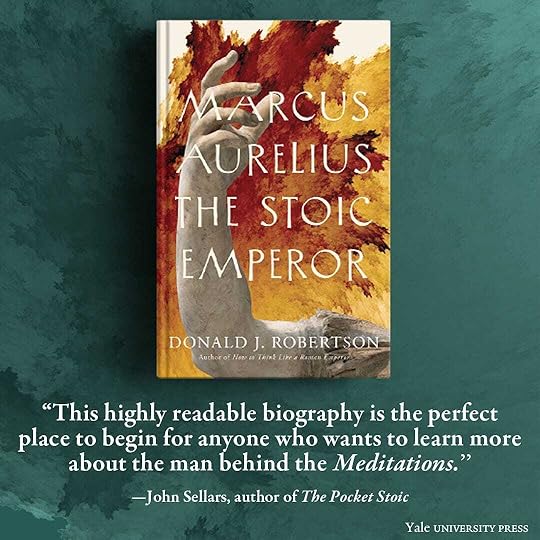
Thank you for reading Stoicism: Philosophy as a Way of Life. This post is public so feel free to share it.
December 14, 2023
Lameness is an impediment to the leg but not to the will
CommentaryDisease is an impediment to the body, but not to the moral purpose, unless that consents. Lameness is an impediment to the leg, but not to the moral purpose. And say this to yourself at each thing that befalls you; for you will find the thing to be an impediment to something else, but not to yourself.
This passage has attracted attention because Epictetus was reputedly lame himself. In Discourses 1.16, for instance, he says: “For what else can I do, a lame old man, than sing hymns to God?” His lameness was also referred to by later authors. For example, Celsus, who came from the generation after Epictetus, wrote that the Stoic philosopher was crippled as a slave when his owner, Epaphroditus twisted his leg until it snapped.
December 7, 2023
Stoic Mindfulness in a Nutshell
Ever since I began researching and writing about Stoicism, about two decades ago, I’ve been looking for ways to capture the basic psychological practices of Stoicism in the simplest possible set of instructions. The Stoic Mindfulness and Resilience Training (SMRT) online course that I designed for Modern Stoicism was a first step in that direction. It has now been completed by thousands of participants, allowing us to collect data that suggest even a very simplified Stoic routine can have measurable benefits psychologically.
There are many psychological techniques described in the surviving Stoic writings. I counted about eighteen in The Philosophy of Cognitive-Behavioural Therapy. (I explain how to use them in daily life in How to Think Like a Roman Emperor.) Some of these are exercises done periodically such as contemplating the world as though seen from above or asking yourself what a perfect Sage would do when faced with certain types of circumstances. I think it’s clear, though, that these are all grounded in one continual practice, which Epictetus called prosoche or “attention”, i.e., paying attention to our ruling faculty (hegemonikon) and the way we use our judgment to form opinions, particularly our value judgments.
Attention (prosoche) is the fundamental Stoic spiritual attitude. It is a continuous vigilance and presence of mind, self-consciousness which never sleeps, and a constant tension of the spirit. Thanks to this attitude, the philosopher is fully aware of what he does at each instant, and he wills his actions fully. (Hadot, 1995, p. 84)
In my experience, most people find it natural to refer to this continual attention to their own thought processes as the practice of “Stoic mindfulness”. (Although, it’s not necessarily the same as “mindfulness” in Buddhism.)
More specifically, Epictetus explains that what Stoics should pay continual attention to is the principle that good and evil reside in their own choices rather than in any external events. Whenever we notice ourselves becoming upset we should pause to ask whether the thing we’re concerned about is up to us or not. If not then we shouldn’t assign value to it in a way that causes us to become upset. We should ask ourselves instead what aspects of the situation are up to us — our own thoughts and actions — and how we could respond more wisely by taking greater responsibility for these.
The reason we’re often unaware of this, though, is that our thoughts become fused with our perception of external events. If I’m very upset with someone, I just view them as an awful person. That’s how I see them. Being good or bad is a quality they appear to possess, like being big or small, or having blue eyes or brown ones. In order to pay attention, mindfully, to the way we’re using value judgments we first have to separate them from reality. I have to realize that the “awfulness” I perceive is a quality projected onto the other person by me and not something I’m passively observing that somehow exists apart from me. As Hamlet said, “there is nothing either good or bad, but thinking makes it so.” For Stoics that’s true of external things, although our own character can certainly still be called either good or bad.
Aaron T. Beck, the founder of cognitive therapy, called this realization, that our thoughts are separate from reality, “cognitive distancing”.
“Distancing” refers to the ability to view one’s own thoughts (or beliefs) as constructions of “reality” rather than as reality itself. (Alford & Beck, 1997, p. 142)
He explained it by analogy with a set of coloured glasses. If you look at the world through rose-tinted spectacles for long enough you might be forgiven for assuming that the whole world is simply coloured pink and seems so to everyone else. Imagine, though, that one day you met someone wearing dark blue glasses who told you that the whole world seemed cold and blue to them. Realizing that the outside world itself is neither completely pink nor blue but that it’s being coloured by the lenses through which you’re looking is cognitive distancing — the ability to notice the distinction between the lens through which you’re looking and the events at which you’re looking.
In cognitive therapy, we sometimes help clients to do this by teaching them to use strange neologisms like the word “catastrophizing”. (Turning a noun into a verb in this way is called “verbing” or “verbification”.) Imagine someone has been dumped by his girlfriend and says “It’s a catastrophe!”, as though he’s just describing an objective fact about the situation. The therapist might encourage him to say instead that he’s “catastrophizing” it, if that helps him to take responsibility for choosing to view it as a catastrophically bad. Indeed, another person might have viewed the same event less catastrophically, with relative indifference, or even as a positive opportunity to learn and grow emotionally. “It’s not events that upset us”, said Epictetus, “but rather our opinions about them.”
In Stoicism, we’re encouraged to continually be on the lookout for these sort of distressing opinions. Epictetus says that whenever you’re troubled emotionally by an impression concerning external events that’s a warning sign that you’ve fused it with a value judgement. He tells his students to respond to upsetting impressions — such as “My partner lied to me; it’s a catastrophe!” — by literally speaking to them as follows: “You are just an impression and not at all the thing you claim to represent.” It’s not a true objective representation of events (phantasia kataleptike), in other words, because it’s fused with a strong value judgment of the kind that distorts events and causes us to experience emotional distress.
Other common ways of gaining cognitive distance include:
Translating your feelings into words by stating the thoughts that are causing them, e.g., “I feel as though everyone hates me and that’s awful.”
Referring to your thoughts in the third person, e.g., “Donald is currently viewing this situation as if it were catastrophic.”
Keeping a tally of the frequency of certain thoughts or feelings so that you increasingly view them as events in their own right.
Writing your thoughts down in a journal or on a whiteboard and viewing them in a detached manner, literally from a distance.
Imagining that your thought is written on a pane of glass through which you’re looking at the event, a bit like looking through rose-tinted glasses but with words such as “This is a catastrophe” scrawled on them.
Imagining being in the shoes of someone who views the same situation differently from you, perhaps even a wise person like Socrates, in order to develop the flexibility to move easily between different viewpoints.
Repeating the thought several times with greater awareness of it being an activity in which you’re engaged, e.g., by saying it aloud very slowly or very quickly.
Imagining how you might view the same situation differently years from now, e.g., if you encountered it many times and got used to dealing with it to the best of your ability or were looking back on it with the benefit of hindsight.
Describing the same situation to yourself in a more matter-of-fact way, without using any emotive language or strong value judgments.
Sometimes also considering the consequences of viewing a situation in a particular way can help you to separate your thoughts from external events and envisage other ways of looking at the same situation. The Stoics frequently reminded themselves of the paradox that, according to their philosophy, passions such as fear and anger do us more harm than the things we’re upset about. Viewing them in this way requires seeing the beliefs underlying them as, in a sense, arbitrary and unhelpful — we could easily look at the situation in a more helpful way.

As Epictetus put it, “everything has two handles”, a broken handle and a good one. When we become upset we’re trying to pick up events using the broken handle, i.e., an unhealthy perspective. However, often just realizing that’s what we’re doing is enough to weaken the grip that unhealthy beliefs and passions have over our mind. All of the techniques above are just gimmicks, in a sense — props to help you get the cognitive knack of separating your value judgments from external events.
I’ve increasingly come to the conclusion that this ability to gain cognitive distance lies at the psychological core of Stoicism. In a sense, it boils down to wholeheartedly embracing the famous precept that “it’s not events that upset us but our opinions about them”. Whereas in CBT it’s usually presented as a cognitive technique to cope with certain difficult situations, in Stoicism it forms part of a whole philosophy of life. Stoic mindfulness, or prosoche, is the continual awareness of how our value judgments are shaping our feelings, particularly when we begin to grow distressed or irritated with life.
This becomes a more general trait of resilience when we apply it across a wide range of situations. However, it’s also maintained by certain underlying philosophical beliefs concerning the nature of our value judgments. Modern psychologists would potentially classify these as “meta-cognitions” — beliefs about beliefs. In a future article, I hope to return to this subject and explore the ways in which Stoic philosophy is meta-cognitive insofar as it teaches us to experience certain types of belief or judgment in a novel manner.

Areté: Philosophy and Coaching
In this episode, I speak with Brian Johnson, the Founder & CEO of Heroic Public Benefit Corporation. Brian is the author of a new book called Areté: Activate Your Heroic Potential.

Thank you for reading Stoicism: Philosophy as a Way of Life. This post is public so feel free to share it.
HighlightsWhat Brian’s new book Arete is about
How Brian has been influenced by Stoicism
What is “Targeted Thinking” – can you explain to listeners what you mean by that and why it’s so important?
You talk quite a bit about wisdom. I like to ask different people how they would define what they mean by the word wisdom.
You talk in the book about being a parent – what do you think the main things to bear in mind are when trying to be a role model or offer guidance to our children?
How can we avoid becoming victims of our own anger?
How people can find out more about what Brian is doing through Heroic
LinksArete: Activate your Heroic Potential
Thank you for reading Stoicism: Philosophy as a Way of Life. This post is public so feel free to share it.



